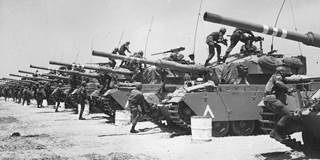The world is about to mark the 50th anniversary of the June 1967 war between Israel and Egypt, Jordan, and Syria – a conflict that continues to stand out in a region with a modern history largely defined by violence. The war lasted less than a week, but its legacy remains pronounced a half-century later.
NEW YORK – The world is about to mark the 50th anniversary of the June 1967 war between Israel and Egypt, Jordan, and Syria – a conflict that continues to stand out in a region with a modern history largely defined by violence. The war lasted less than a week, but its legacy remains pronounced a half-century later.
The war itself was triggered by an Israeli preemptive strike on the Egyptian air force, in response to Egypt’s decision to expel a United Nations peacekeeping force from Gaza and the Sinai Peninsula and to close the Straits of Tiran to Israeli shipping. Israel struck first, but most observers regarded what it did as a legitimate act of self-defense against an imminent threat.
Israel did not intend to fight on more than one front, but the war quickly expanded when both Jordan and Syria entered the conflict on Egypt’s side. It was a costly decision for the Arab countries. After just six days of fighting, Israel controlled the Sinai Peninsula and the Gaza strip, the Golan Heights, the West Bank, and all of Jerusalem. The new Israel was more than three times larger than the old one. It was oddly reminiscent of Genesis: six days of intense effort followed by a day of rest, in this case the signing of a cease-fire.

NEW YORK – The world is about to mark the 50th anniversary of the June 1967 war between Israel and Egypt, Jordan, and Syria – a conflict that continues to stand out in a region with a modern history largely defined by violence. The war lasted less than a week, but its legacy remains pronounced a half-century later.
The war itself was triggered by an Israeli preemptive strike on the Egyptian air force, in response to Egypt’s decision to expel a United Nations peacekeeping force from Gaza and the Sinai Peninsula and to close the Straits of Tiran to Israeli shipping. Israel struck first, but most observers regarded what it did as a legitimate act of self-defense against an imminent threat.
Israel did not intend to fight on more than one front, but the war quickly expanded when both Jordan and Syria entered the conflict on Egypt’s side. It was a costly decision for the Arab countries. After just six days of fighting, Israel controlled the Sinai Peninsula and the Gaza strip, the Golan Heights, the West Bank, and all of Jerusalem. The new Israel was more than three times larger than the old one. It was oddly reminiscent of Genesis: six days of intense effort followed by a day of rest, in this case the signing of a cease-fire.